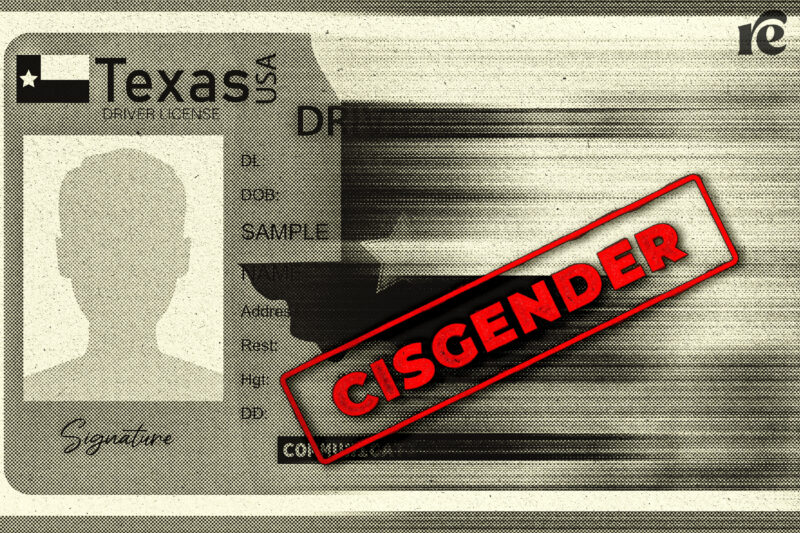In New Policy, Texas Agency Won’t Change Gender Markers on IDs
The Texas Department of Public Safety also directed employees to send gender marker change requests, including identifying information, to a specific email address.

Under a new policy issued August 20, the Texas Department of Public Safety (DPS) will no longer allow trans Texans to change the gender markers on their driver’s licenses or state identification cards.
A department-wide email announcing the policy also directed employees to forward all such requests and accompanying documentation to a particular email address where they will be stored. A screenshot of the email was shared with Rewire News Group by the advocacy organization Equality Texas.
“All court order sex change documentation that cannot be processed should be scanned into the record and the customer’s name and DL/ID number be emailed to [email protected],” the email reads. “Please notate on the email in the subject line ‘Sex Change Court Order.’”
“Texans will now be subject to involuntary surveillance for simply trying to update a government document,” Brad Pritchett, interim CEO of Equality Texas, said in a statement. “There is no clear reason why this information would be useful to the DPS, nor is there a legitimate reason to deny gender marker updates on driver’s licenses.”
Name changes won’t be processed, the email adds, if they are accompanied by gender marker changes. Under the new policy, gender changes will only be granted if an ID shows the wrong gender due to a clerical error.
In a statement, DPS said the “Office of the Attorney General (OAG) has recently raised concerns regarding the validity of court orders being issued which purport to order state agencies—including DPS—to change the sex of individuals in government records … the lack of legislative authority and evidentiary standards for the Courts to issue these orders has resulted in the need for a comprehensive legal review by DPS and the OAG.”
Trans Legal Aid Clinic of Texas is advising those who have a court order but haven’t yet updated their gender markers to hold off unless or until the policy is suspended, rescinded, or changed, attorney and clinic board member Pete Makopoulos-Senftleber said.
“You’re going to get turned away anyway,” Makopoulos-Senftleber said. “So at this point, there’s really no upside to trying.”
But the risk of surveillance is even more significant.
“They are compiling a list,” Makopoulos-Sentfleber said. “The only speculation is what it’s going to be used for, but the existence of the list alone, in my opinion, is scary. I don’t want to be on any government list for any reason.”
“We don’t know … if some or part of the information will be subject to or released in Public Information Act requests, at which point people’s information could be scrutinized or utilized by bad actors,” he added.
As for the questions DPS raised about the “validity” of court orders to change gender markers, courts issue them according to standards laid out in Texas law, Makopoulos-Senftleber said.
“There’s zero validity to the argument,” he said of DPS’ statement. “The argument is a red herring.”
Pritchett echoed this.
“Updating a gender marker in the state of Texas is a complicated process that requires the time, energy, and resources to secure a court order,” he said. “If Texas agencies are free to ignore Texas court orders, what other parts of the law will they ignore?”
The move raised especially loud alarm bells for advocates given Attorney General Ken Paxton’s previous attempts to surveil trans Texans.
In 2022, Paxton’s office asked DPS for a list of people who had changed the gender markers on their state IDs. An employee familiar with the request told the Washington Post that Paxton’s office wanted “the number of people who had had a legal sex change,” and a list of names. Paxton’s office would not confirm it made the request.
This came just months after Paxton issued a legal opinion saying that gender-affirming care for minors could be considered child abuse, and Gov. Greg Abbott directed the state’s Department of Family and Protective Services to investigate families seeking such care. That directive is partly blocked as a legal challenge proceeds, but other anti-trans policies enacted by the Texas government in recent years are still in effect, including bans on gender-affirming care for minors and restrictions on what sports teams trans athletes can join.
“There are 92,900 trans adults in Texas,” Prichett said. “Just like people who change their names after marriage want their correct name on their license, trans Texans want their driver’s license to reflect their gender. We use our IDs to navigate all areas of life: driving, voting, employment. Having an ID that reflects who you are is a basic form of dignity that many take for granted.”
But for the foreseeable future, trans Texans are stuck in limbo. For now, Makopoulos-Senftleber said, the message is: “Don’t go to DPS.”
